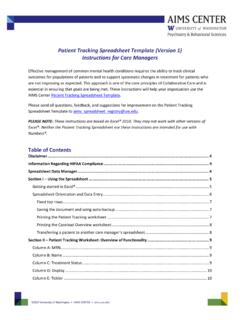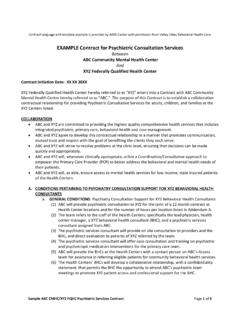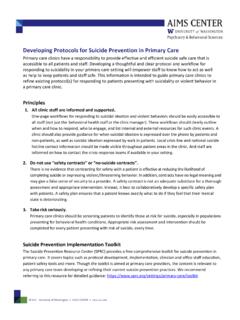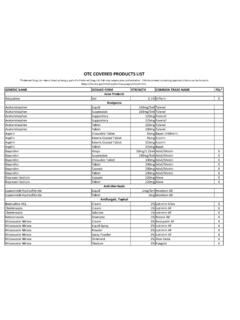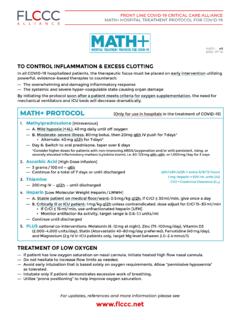Transcription of Cognitive Behavioral Therapy for Insomnia (CBTi)
1 1 Cognitive Behavioral Therapy for Insomnia (CBTi) Treatment Manual Based on treatment methods developed by: Richard R. Bootzin and Charles Morin Based on a CBT Manual developed by: Ricardo Munoz and Jeannine Miranda Revisions by: John McQuaid, Jocelyn Sze, and Poorni Otilingam 2 Table of Contents Topic Page Session 1: Introduction 3 Session 2: Sleep Efficiency: Reclaiming the bed for sleep 9 Session 3: Sleep Hygiene Behaviors 13 Session 4: Sleep and Your Thoughts Session 5+: Titration and Compliance 16 19 Session 6: Relapse Prevention: Action Plan for Addressing Insomnia in the Future 20 3 Session 1 Purpose of today s session: 1.
2 Introduction and structure of treatment 2. Discuss Sleep log INTRODUCTION What this program is NOT: it s not about just drink some chamomile tea before bed it s not about fancy bells and whistles it s not about sleep meds it s not a magic pill What this program is IS: it s hard work it requires commitment it s practical and focused it WORKS -- in fact, it s the most effective treatment out there for Insomnia ! Our GOALS: increase the amount of time you sleep increase the quality of your sleep increase control of your sleep patterns How will we do this? Meet 5+ times Learn and practice specific strategies for improving sleep Track how the things we try are working Brainstorm to overcome hurdles Why use CBTi for sleep problems?
3 CBTi is considered the first-line, gold standard treatment for Insomnia o It works better than sleep meds in leading to durable improvement o It has no side effects and no potential for dependency/addiction o It s a more affordable treatment option in the long run If you practice these behaviors every day, you should start to see improvement after only 4 weeks About 80% of people who complete CBTi demonstrate significant long-term sleep improvement A note about sleeping medications: We are going to show you ways to manage your sleep without the use of sleep meds. On sleep meds, people often awaken feeling sedated or groggy.
4 Often, sleep meds stop working over time because your body gets used to them. If you are currently taking sleep meds, you can still complete this treatment in conjunction with your medication regimen. Always consult with your doctor first if you decide to make changes to your medication regimen. 4 Exercise: 1. Complete the sleep log for last night as an example Assignment: 1. Complete the sleep log each morning 2. Review Sleep Hygiene Guidelines and star the ones you think you might be breaking. Do not worry if some of these guidelines don t make immediate sense; we will be discussing certain guidelines in more depth in future sessions.
5 5 Sleep Hygiene Guidelines Good dental hygiene is important in determining the health of your teeth and gums. Similarly, good sleep hygiene is important in determining the quality and quantity of your sleep. Review the below guidelines and check the ones you think you might be breaking. Screen time: Turn off TV, computers, tablets, and smart phones 1 hour Before Bedtime The short waves of blue light (emitted from the screens of TVs, laptops, iPads, smart phones, etc.) mimic daylight. Thinking it s daytime, your brain suppresses melatonin and becomes more alert because we have evolved to see this type of light only during the day.
6 What s more, the overall stimulation we get from these devices serves to keep us more alert. If TV is your relaxing activity, try to move it up a bit earlier in the evening. Caffeine: Avoid Caffeine 6-8 Hours Before Bedtime Caffeine disturbs sleep, even in people who don t think they experience a stimulation effect. Individuals with Insomnia are often more sensitive to mild stimulants than are normal sleepers. Caffeine is found in items such as coffee, tea, soda, chocolate, and many over-the-counter medications ( , Excedrin) Caffeine should be avoided in the afternoon and evening, preferably by 1pm. You might consider a trial period of no caffeine at all.
7 Nicotine: Avoid Nicotine Before Bedtime Although some smokers claim that smoking helps them relax, nicotine is a stimulant. The initial relaxing effects occur with the initial entry of the nicotine, but as the nicotine builds in the system it produces an effect similar to caffeine. Nicotine should be avoided near bedtime and during the night. Don t smoke to get yourself back to sleep. Alcohol: Avoid Alcohol After Dinner Alcohol often promotes the onset of sleep, but as alcohol is metabolized sleep becomes disturbed and fragmented, leading to poor sleep quality. Limit alcohol use to (1 beer or glass of wine for women, 2 for men).
8 Sleeping Pills: Sleep Medications are Effective Only Temporarily Research has shown that sleep meds lose their effectiveness in about 2 - 4 weeks when taken regularly. Over time, sleeping pills actually can make sleep problems worse. When sleeping pills have been used for a long period, withdrawal from the medication can lead to an Insomnia rebound. Thus, after long-term use, many individuals incorrectly conclude that they need sleeping pills in order to sleep normally. Keep use of sleep meds infrequent, but don t worry if you need to use one on an occasional basis. (And always consult with your doctor first if you decide to make changes to your medication regimen.)
9 Regular Exercise Exercise has been shown to aid sleep, although the positive effect often takes several weeks to become noticeable. Exercise within 2 hours of bedtime may elevate nervous system activity and interfere with sleep onset. Get regular exercise, preferably at least 20 minutes each day of an activity that causes sweating. 6 Hot Baths Spending 20 minutes in a tub of hot water an hour or two prior to bedtime may promote sleep. Bedroom Environment: Moderate Temperature, Quiet, and Dark Extremes of heat or cold can disrupt sleep. Noises can be masked with background white noise (such as the noise of a fan) or with earplugs.
10 Bedrooms may be darkened with black-out shades or sleep masks can be worn. Position clocks out-of-sight since clock-watching can increase worry about the effects of lack of sleep. Eating A light bedtime snack, such a glass of warm milk, cheese, or a bowl of cereal can promote sleep. Avoid heavy or spicy meals before bedtime and any caffeinated foods ( , chocolate). Avoid snacks in the middle of the night since awakening may become associated with hunger. Do not go to bed too hungry or too full. Avoid/Reduce Naps The sleep you obtain during the day takes away from your sleep need that night resulting in lighter, more restless sleep, difficulty falling asleep, and/or early morning awakening.

